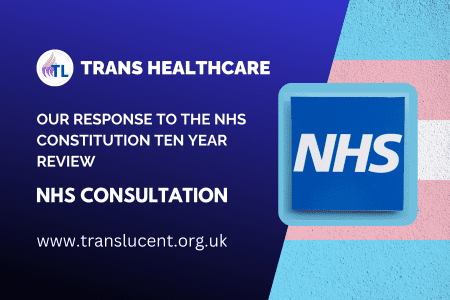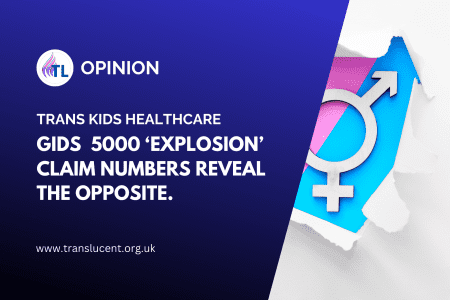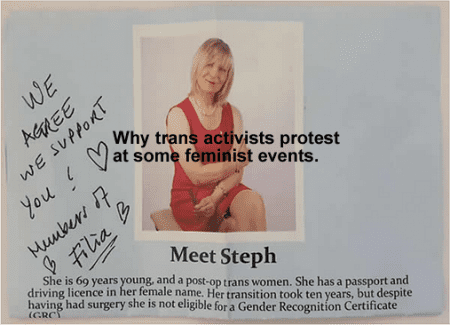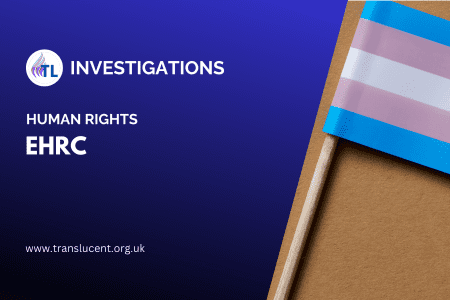As we all know, 31st March is Trans Day of VisibilityTrans Day of Visibility International Transgender Day of Visibility (often referred to as TDOV or Trans Day of Visibility) is an annual event occurring on March 31[1][2] dedicated to celebrating transgender people and raising awareness of discrimination faced by transgender people worldwide, as well as a celebration of their contributions to society. Further Reading https://en.wikipedia.org/wiki/International_Transgender_Day_of_Visibility , and while this year’s was memorable for all the wrong reasons thanks to our incompetent and bigoted UK Government, on a personal level I had quite a nice surprise.
I received a phone call out of the blue from the new East of England Gender Service, a Nurse & GP led pilot being coordinated by the Nottingham GIC, and they were asking if I wanted to transfer to them to speed up being seen on the NHS.
I did my initial referral to the abysmal Tavistock & Portman GIC in August 2020, which means I’ve been on the waiting list for about 20 months. Just getting that referral received by the Tavi was a complete farce that took 7 months to resolve, and frankly I didn’t really want to be seen by the GIC with probably the worst reputation in the UK for how it treats trans people, nor wait an additional (official) 3 years to be seen.
So I jumped at the chance, for obvious reasons.
Some quick background – I’m almost fully socially transitioned, have pretty severe ADHD, and been on HRT for about 9 months – 3 months self medding and the rest via a bridging prescription. Haven’t changed my name yet either.
Anyway, they sent me some forms and info, which I completed straight away and sent back. It should be noted that the language used on some of the forms wasn’t exactly trans friendly and made me twitch, and that’s something Im going to feed back.
But a week and a half later I had my first appointment over MS Teams. In all honesty I was dreading it. Even though I know the pilot clinics are operating on an updated NHS protocol which is a marginal improvement over the one used at the failing GICs, I was wide awake at 3am on the day of my appointment, which was at 9am.
The appointment itself was an initial assessment which would take an hour and a half, and was with one of the Nurses who have been trained in assessment, rather than a ‘mental health professional’. I’ll call her J, and she was really very nice.
We started with the usual verification stuff, and disappointingly also duplicated info I’d already provided in the intake forms – but that took little more than 5 mins to do, so was pretty much just an annoyance as I don’t like replicating effort.
So, what was it like? For obvious reasons I’m not going to go into personal details too much, but I will hopefully try and keep the flavour.
First off, and one that concerns most of us – intrusive questioning, especially around sex / sexuality etc.
It was completely absent. The nearest we got to questions about sex / sexuality was asking what mine was.
Next up was my history, from childhood upwards, when I first felt different, how my dysphoria manifests, what I did (or didn’t) do to alleviate it, etc etc etc. Now my history is one of an older transitioner (I’m in my 50s), so it’s variations of suppression, depression, breakdowns etc, interspersed with exploration & how that made me feel, how I explored etc. I’ve already done a load of stuff to alleviate my dysphoria (some laser hair removal, body hair removal, socially transitioning etc) so we discussed that too.
Now my life has been pretty full of trauma, which is unsurprising to anyone who has actually talked with trans people and listened to us – because the vast majority of it is caused by how people treat us, not who we are in ourselves, but personally, I think there seemed to be an over emphasis on talking about trauma during the assessment (including childhood and sexual abuse trauma).
That said, I didn’t get the impression it was being done as a way to try and deny or invalidate who I was – more a case of what I’d experienced and whether I needed any further help in that area to resolve issues. Not an issue for me as I’d already sorted all that out privately, and I’m not interested in revisiting it – which I said, and was accepted.
We also went over my ADHD diagnosis and how I’d been mistreated by my local mental health services during it (yes, I was quite scathing), and whether there was a history of other mental health issues in the family. While I suspect there is, I’m the only one to have been diagnosed with anything so far, so it’s not exactly a history. I’m also waiting for an ASD assessment, but that wasn’t an issue either. Again, I didn’t get the impression they were looking for reasons not to provide treatment, but more whether I was having issues that needed additional help. In short my neurodiversity didn’t seem to be an issue.
We covered other usual stuff – medical history, fertility, what support I have, family reactions to coming out etc – again I think as a way of gauging whether I needed help in this area. I don’t, so we carried on.
Lastly we talked about was what my intentions and expectations on treatment were. I’m pretty well versed with what the NHS actually offer so that was easy – facial hair removal, voice coaching, shared care for my HRT and surgery – most of which should happen in parallel according to the new protocols.
And that was pretty much it. J is now my contact point for any questions / comments in the future during my entire course of treatment, and as soon as I get my next set of bloods done I need to send the results over.
So what’s next?
Now it all goes off to the lead clinician for verification / acceptance and scheduling of a second appointment, which will probably be in 4 – 6 months, in person at either Cambridge or Nottingham. And they send a letter to my GP confirming that they are seeing me at the service, but with no other detail than that.
Overall first impressions?
I wouldn’t say it was pleasant, it’s definitely not informed consent in any capacity, and it’s still over medicalised to a stupid degree. I was emotionally and physically exhausted at the end of it. But compared to what we hear about treatment at the GICs it’s a pretty big step in the right direction. Removing ‘mental health professionals’ from as much of the assessment process as possible is a major, significant improvement that probably shouldnt be understated.
My main impression was that they’re primarily looking to see if you are happy, stable and well supported in your transition – however that looks for you, and whether there’s a need for additional support. It was relaxed and friendly enough that we had a few laughs during the assessment too.
Now I have a list as long as my arm for the 2nd appointment, and it’s back to waiting.
I’ll keep you posted.











 To provide the best experiences, we use technologies like cookies to store and/or access device information. Consenting to these technologies will allow us to process data such as browsing behaviour or unique IDs on this site. Not consenting or withdrawing consent, may adversely affect certain features and functions.
To provide the best experiences, we use technologies like cookies to store and/or access device information. Consenting to these technologies will allow us to process data such as browsing behaviour or unique IDs on this site. Not consenting or withdrawing consent, may adversely affect certain features and functions.